|
|
|
|
|
|
|
|
|
|
|
 |
|
|
|
Some
movies are knockouts from the get go. They sweep you up like Ralph Fiennes gathering
you in his arms and then…and then…and then there are some movies that you always
knew you liked, but then they take off their glasses, run their fingers through
their hair, and suddenly you realize you're in love. Office Space, for
me, is in the latter category. |
|
I
under appreciated Office Space when it came out in 1999. It lacks the
bravado of my official favorites for that year, but repeated viewings (thank
you, cable!) have proved it to be a lasting gem. If you currently hold, have
ever held, or ever expect to hold a job in your life, you will find something
in Office Space familiar. For instance, just because you don't work in
the food service industry doesn't mean you don't have a yappy, fake, overeager,
overblonde co-worker named Byron, excuse me, Brian tattling on you and sucking
up to your supervisor; just because you don't work in an office doesn't mean
you've never had multiple bosses correcting the same mistake (or one boss who
won't just tell you what your mistake is), or have never sat through a deadening
corporate meeting. |
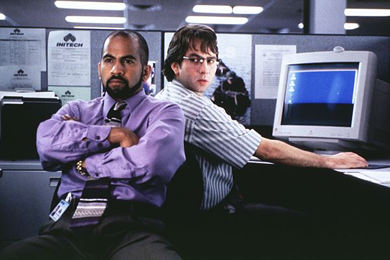 Gangstas:
Samir Nagonnaworkhereanymore
Gangstas:
Samir Nagonnaworkhereanymore
& Michael Bolton (Ajay
Naidu & David Herman) |
|
|
|
These
sorts of affronts that make work life hell are respectfully catalogued in Office
Space. After a particularly aggravating day, programmer Peter Gibbons asks
his neighbor Lawrence if anybody in his line of work--construction--ever accuses
him of having "a case of the Mondays" if he seems to be feeling down. Lawrence,
aghast, replies, "No, man, no. God no! A fella'd probably get his ass kicked
for saying something like that." And that's Peter's first glimpse of a better
life. His real breakthrough comes when his girlfriend takes him to a hypnotherapist
who puts Peter in a state of nonchalance, then dies and leaves him there. Freed
from his misery, Peter begins to free himself from the things that make him
miserable. He sleeps through the Saturday he was supposed to spend at work,
and blithely hangs up on his girlfriend when she calls to yell at him for doing
so. He had the feeling she was cheating on him anyway ("I get that feeling,
too," his friends concurred without follow-up). He violates one taboo by inviting
a waitress to lunch during her shift, then demolishes another when he frankly
discusses his dubious work habits with visiting hatchet men Emboldened by these
early successes, Peter becomes more lackadaisically brazen. Against Geto Boys'
rap declaration "Damn, it Feels Good to be a Gangsta," he commits acts of small
and liberating vandalism in the office, while management and serf alike are
struck dumb by his unprecedented behavior. Eventually, his sense of entitlement
becomes hubristic; he dares too much and risks a terrible end. |
|
|
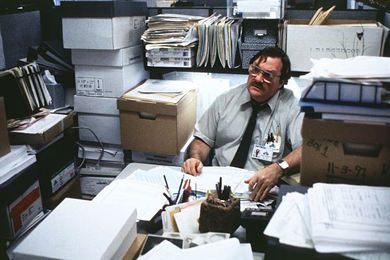 Gangsta:
Milton (Stephen Root)
Gangsta:
Milton (Stephen Root) |
With
Beavis and Butt-head, King of the Hill, and Office Space,
(based on a series of short "Milton" cartoons which I haven't seen) writer-director
Mike Judge has staked out a place in three seemingly threadbare genres-adventures
of idiot teens, suburban sitcom, and workplace comedy-and invested them with
rare suppleness and invention. Judge is a smart guy and a humanist who honors
his creations because he has insight into the entire context of their lives.
Beavis and Butt-head are as stupid as you'd care to allege, but their characterizations
are authentic and specific. They are anti-cute boys (after a body cavity search
in Beavis and Butthead Do America, Butt-head wonders, "Did I just score?")
of a familiar stripe. |
|
|
Butt-head, for instance, has a
mouthful of braces, representing a skewed-though far from uncommon-vision
of child welfare where faith in orthodontia trumps parental involvement; and
as repulsive and misguided as they are, there's a poignancy to how blasé they
are about the beatings they take, and how they expect abandonment so utterly
that they are not at all phased when it inevitably happens. King of the
Hill is both a return and a reinvention of family sitcoms in which father
doesn't know everything, but he is a thoughtful, capable, adult, and an anomaly
in the in the history of television in that Hank Hill has only a high school
education and yet isn't fat, crude, or buffoonish. Even my beloved Simpsons
wasn't willing to take that leap.
|
|
|
With
Office Space, Judge looks at jobs and takes seriously the indignities
and compromises that come with a paycheck, but with an inclusiveness and moderation
that never panders to a smug Power to the People mentality. Gibbons is a primitive,
as his simian name indicates. His dream is to do nothing, and it's a kick to
watch him start to live that ethos. His glib attacks on cubicle walls and rah-rah
company banners are happy and welcome, but they pale with the ferocity with
which his displaced co-workers Michael and Samir take after a hated piece of
equipment because they made an honest investment in their work and were betrayed.
The tenuous and disingenuous loyalty businesses show toward their serfs is more
than a matter of cheese moving, it's an assault on personal security and dignity.
You can hear it in the chortling of the managers and "efficiency experts" Bob
and Bob in |
|
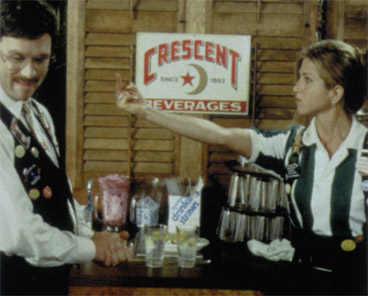 Gangsta:
Joanna (Jennifer Aniston) shows her
Gangsta:
Joanna (Jennifer Aniston) shows her
boss (Mike Judge) some flair |
|
|
|
Office
Space, and in the chirpy tones of the Grim Reapers from Cosmodemonic HR
who occasionally descend upon us, concealing their bat wings and sickles beneath
Ann Taylor suits. It's a power as fickle as it is ruthless-the file directly
below the delinquent Peter's in the Bobs' extraneous employee pile is that of
his "unholy pig of a boss"-and a necessary fixation of helpless rage. There
are dozens of other keenly observed examples of petty degradation in Office
Space, but also an awareness that there's not much to be done about them.
Perhaps that's why so many critics accused OS of losing it's nerve/vision
in the last half. But as crappy as life and work can be, there is an integrity
to Office Space that cannot let it get out of hand. Peter is not Norma
Rae, and he certainly doesn't work in Matewan, and to turn his revolt into a
polemic would be inappropriate and an insult to labor. The outlandish equation
he makes between a bit of stupid officiousness in Joanna's job with Nazism is
a sign of his corruption, and it isn't permitted to stand. There's petulance
in the world and there's oppression, and Judge is sensible enough to know which
is which. |
|
|
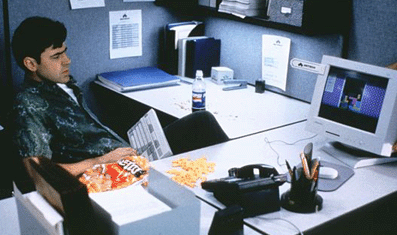 Gangsta:
Peter (Ron Livinston)
Gangsta:
Peter (Ron Livinston) |
|
That's
why his use of rap music is so canny. It a good one-off joke when the dweebiest
looking white guy in the film is caught enthusiastically singing it in his car
during the opening credits. It gets better when he turns it down, lowers his
voice to a mutter, and locks his door when a black street salesman makes his
rounds past the car, and got another ironic twist when the rap lover's name
was revealed to be Michael Bolton. Judge doesn't settle there, though. His mating
of "Damn, it Feels Good to be a Gangsta" with Peter's low key rebellion and
"Still" with Michael and Samir's violence evince a keen understanding of the
fraud of outlaw |
|
|
chic and the wincing pain
of disenfranchisement, but appropriating music that reflects an experience
so far removed from that of the inhabitants of Office Space gives both
an extra comic dimension. And if that weren't enough, two of the songs on
the soundtrack are hiphop and R&B renditions of the hit country songs "Take
this Job and Shove It" and "9 to 5." Like rap and R&B, country music is the
work of a traditional underclass, but the combination is fresh and surprising.
Furthermore, both songs are from a distinct time and place, the recession
era 80s, where men telling their bosses to shove jobs was an empowering daydream
and under-appreciated women slaving away was commonplace. Office Space,
however, is fixed on the crest of the biggest economic boom in the history
of the United States. White male job insecurity-especially for technical types-was
at an all time low, but it's a woman, Peter's waitress girlfriend Joanna,
who tells off her boss with flair, and men who thanklessly labor on iffy projects
(in this case, the Y2K problem, which proved to be a fin de cycle non-event).
|
|
|
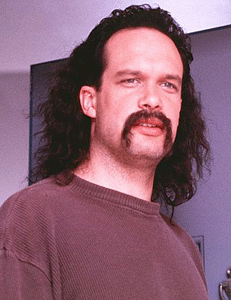 Gangsta: Lawrence
Gangsta: Lawrence
(Diedrich Bader) |
Office Space is
ultimately about something as unfashionable as living with adult choices and
responsibility rather than succumbing to juvenile impulsiveness. After a fight
in which Peter's proletariat poses mask basic sexual jealousy, Joanna tells
him to call her when he grows up, but since that won't ever happen don't call.
But he does grow up, and gracefully. Mike Judge is turning out to be one of
America's greatest, and unlikeliest, advocates of maturity.
Written by Sharon C. McGovern
From
Vol. 27
Back to Cobra Movies
|
|
|
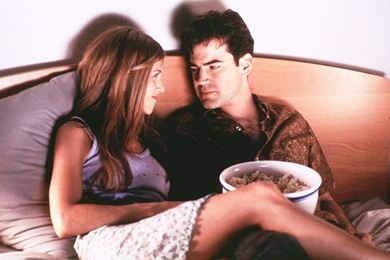 Gangstas:
Joanna & Peter
Gangstas:
Joanna & Peter |
|
|
|
 |
 |
 |
 |
 |
 |
 |
 |
 |
 |

 Gangstas:
Samir Nagonnaworkhereanymore
Gangstas:
Samir Nagonnaworkhereanymore 


 Gangsta: Lawrence
Gangsta: Lawrence  Gangstas:
Joanna & Peter
Gangstas:
Joanna & Peter